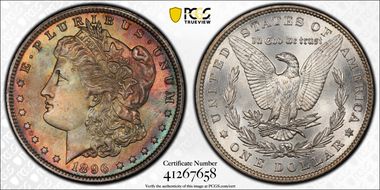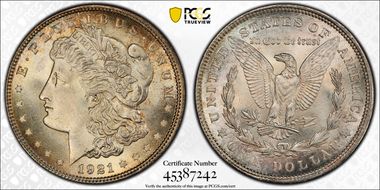Wayne’s Morgans 的钱币相册
Ringed with blue, red and yellow, this gem Morgan dollar exhibits the classic album rim toned look. The reverse is frosty and proof-like. The 1880-S Morgan Dollar is one of the most common coins in the series. It is fairly easy to find up to MS66 condition.
Ringed with blue, red and yellow, this gem Morgan dollar exhibits the classic album rim toned look. The reverse is frosty and proof-like. The 1880-S Morgan Dollar is one of the most common coins in the series. It is fairly easy to find up to MS66 condition.
Richly toned a pretty lavender-grey with stunning rainbow tints featured along the obverse rim and similar coloration more prevalent on the reverse of this New Orleans issue preserved in gorgeous premium gem condition.
Full rainbow of colors on the obverse starting at the rim and toward the center while a muted rainbow rims the reverse of this flashy dollar.
This 1886 dollar is very well struck and has a more satiny or "greasy" luster rather than deeply frosty luster. With a light rim of orange color surrounding blast white devices, the eagle's breast feathers at the center of the reverse are nearly well-struck. The mintage of the 1886-P Morgan dollar is just under 20 million coins. While some were released at the time of striking, many survived untouched in original mint bags until the mid 20th century. Due to this, the 1886-P Morgan dollar is one of the most common in uncirculated grades today, with nearly 1000 equal in grade to this MS67 example. CAC approved.
Ridiculous orange toned centers with blue-silver rims on both the obverse and reverse, as both sides of the coin matches in color, luster and strike. The luster is a bit satiny or "greasy," on the dull side, rather than deeply lustrous and frosty, but the color more than makes up for the lack of flashy surfaces. The Philadelphia Mint struck over 20 million Morgan dollars in 1887.
A thick blue crescent adorns the obverse while peripheral rim toning highlights the reverse...
A thick blue crescent adorns the obverse while peripheral rim toning highlights the reverse...
Blue, orange and gold rim the obverse and reverse in a nearly continuous circle of color and flash on this CAC reviewed, nearly gem New Orleans Morgan dollar.
Blue, orange and gold rim the obverse and reverse in a nearly continuous circle of color and flash on this CAC reviewed, nearly gem New Orleans Morgan dollar.
Blue, orange and gold rim the obverse and reverse in a nearly continuous circle of color and flash on this CAC reviewed, nearly gem New Orleans Morgan dollar.
Blue, orange and gold rim the obverse and reverse in a nearly continuous circle of color and flash on this CAC reviewed, nearly gem New Orleans Morgan dollar.
A ring of blue and red frame the obverse in a typical target toned pattern that will be the object of each coin in this set. Tough coin to find with a decent strike.
A ring of blue and red frame the obverse in a typical target toned pattern that will be the object of each coin in this set. Tough coin to find with a decent strike.
The 1896 is the most common Morgan dollar of the 1890s and is plentiful in all circulation strike grades. Finding one with unique toning and a sharp strike at a high grade was important in making this purchase. This coin exhibits plum and aqua colors along the obverse while the reverse is blast white with strong breast feathers on the eagle. This coin has been stickered by CAC, designating agreement with PCGS's assessment of the coin's authenticity and grade.
Originally in an ANACS MS64 holder, this lustrous, colorful Morgan dollar has upgraded to an MS65 holder.
Originally in an ANACS MS64 holder, this lustrous, colorful Morgan dollar has upgraded to an MS65 holder.
Blue rim toning is featured on the reverse of this Morgan Dollar while gold, russet and blue highlight the rim near Liberty's cap on the obverse.
Blue rim toning is featured on the reverse of this Morgan Dollar while gold, russet and blue highlight the rim near Liberty's cap on the obverse.
Most 1921 Morgan dollars are poorly struck and quite unappealing. This coin may be an exception. With light toning on the obverse and reverse and a decent, though typically shallow strike, this MS66 dollar is better looking than most other 1921s.




















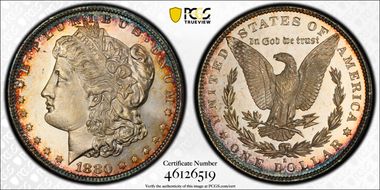

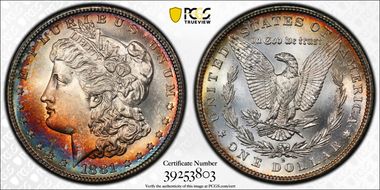
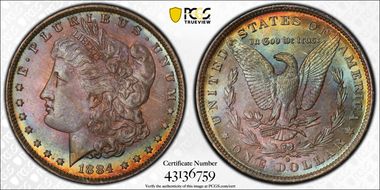
_album.jpg)
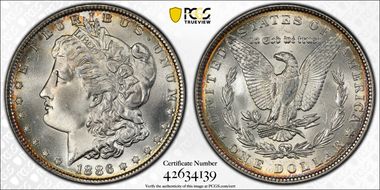
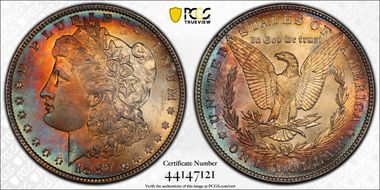






_album.jpg)
_album.jpg)
